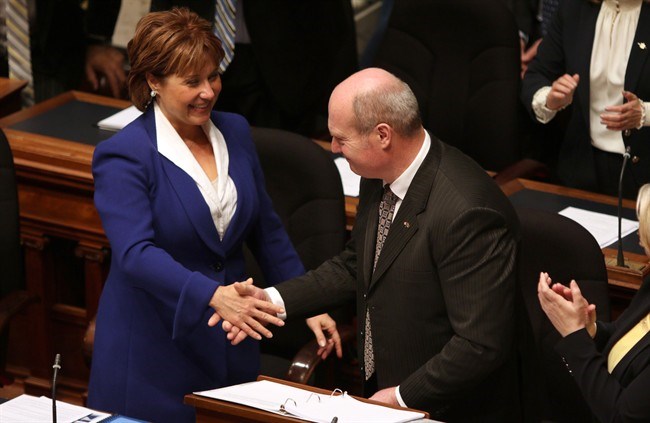The B.C. government will eliminate Medical Services Plan premiums for children, increase support for persons with disabilities and take steps to deal with housing affordability, Finance Minister Mike de Jong announced in the budget Tuesday.
De Jong also unveiled a $100-million prosperity fund — dubbed a pre-election “slush fund” by the NDP — that will be used to pay down the province’s debt over time and make additional investments in health, education, transportation and other priorities.
With B.C. poised to lead the country in economic growth, de Jong said the relatively strong financial picture allows the government to use its $48-billion budget to strengthen the province’s social safety net.
“With a balanced budget, and particularly with reduced debt-servicing costs, we are now in a position to do more to help people who need an extra hand,” he said in his budget speech to the B.C. legislature.
NDP Leader John Horgan, however, accused de Jong of playing a “shell game” by giving with one hand while taking away with another.
In the case of the Medical Services Plan, the government will eliminate premiums for all children next January even as it increases MSP rates by four per cent for adults and nearly 15 per cent for couples.
De Jong said about 70,000 single-parent families will benefit directly from the elimination of premiums for children. A single mother with two or more children will pay only the single-adult rate of $78 per month rather than the three-person rate — a savings of $72 a month or $864 a year.
He also said that an additional 335,000 people will be eligible for reduced premiums.
“I know that some people have advocated eliminating separate MSP premiums altogether,” de Jong said. “But burying MSP into instruments of general taxation doesn’t make them go away. It merely hides them and may create for some the illusion that health care is free, which it certainly isn’t.”
The Hospital Employees’ Union said the MSP relief was welcome, but fell short of what was needed.
“I think it’s hardly innovative to not charge children for access to health care,” said Jennifer Whiteside, the union’s secretary-business manager.
“Frankly, this government today missed a golden opportunity to eliminate MSP premiums altogether and roll it into a progressive tax system.”
Overall, British Columbians will still be paying nearly $80 million more for MSP services in 2017-2018 — even with the changes introduced by de Jong, Whiteside said.
Elsewhere, de Jong announced that monthly income assistance rates for people with disabilities will increase from $906 to $983 effective Sept. 1.
Nearly half the 100,000 people with disabilities will enjoy the full $77-per-month increase. There are thousands, however, who will have to decide whether to keep all of the money or use some of it to purchase a $52-a-month bus pass that they currently receive for free.
“I don’t think this makes life easier for people, but, hopefully, it makes it a little less hard,” de Jong said.
Faith Bodnar of Inclusion B.C. called the increase “embarrassing” and expressed surprise that de Jong paid it so much attention given that some people will get only $25 more a month once they pay for their bus pass.
“I think we can do a lot better,” she said. “We‘re one of the most prosperous provinces and we have some of the lowest PWD rates in the country.”
The Ministry of Children and Family Development, meanwhile, will get $65 million more this year to hire 100 front-line social workers and an additional 30 support staff in the wake of a several high-profile youth deaths.
Representative for Children and Youth Mary Ellen Turpel-Lafond said the budget shows that government was “penny wise and pound foolish” in balancing its books at the expense of vulnerable children.
“They’ve had a stand-pat budget year over year, which, as my office has shown, has created about a $100-million hole in that budget,” she said.
“So, today, they started to plug that with about a $65-million investment, but that only happened after it was so clearly evident that child safety had been compromised.”
On the housing front, the government introduced a property transfer tax exemption on newly built houses and condominiums up to $750,000. Purchasers, who must be Canadian citizens or permanent residents, will save up to $13,000.
“These are significant dollars,” de Jong said. “We’re also hopeful that it will create an incentive and an impetus to construct more homes.”
Government will pay for the exemption by increasing the transfer tax rate from two per cent to three per cent on the fair market value of property over $2 million.
In addition, de Jong said that government will resume tracking foreign purchasers of property in order to better understand what’s driving property prices in the province.
“Beginning in the summer, individuals who purchase property will need to disclose if they are citizens or permanent residents of Canada, and, if they are not, their citizenship and country of residence,” he said.
Horgan said the “cosmetic changes” do nothing to help people get into the housing market. He also criticized government for short-changing social housing, but finding plenty of money to invest in other capital projects.
“That’s a shell game,” he said.
Horgan also noted that the money raised by increasing MSP premiums will fuel the Liberals’ $100-million prosperity fund — some of which will be used for unspecified priorities.
“That sounds like slush fund to me and as we get into the next election campaign I can well imagine Christy Clark will be taking that money and putting it to her interests, not the interests of British Columbians.”
lkines@timescolonist.com
Comment on this article by writing a letter to the editor. Email: letters@timescolonist.com
Or comment by posting a link for this article to Facebook, Twitter or Google+ by clicking one of the icons near the headline.



